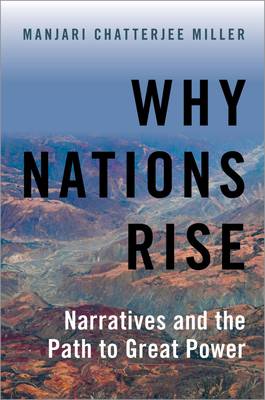
- Afhalen na 1 uur in een winkel met voorraad
- Gratis thuislevering in België vanaf € 30
- Ruim aanbod met 7 miljoen producten
- Afhalen na 1 uur in een winkel met voorraad
- Gratis thuislevering in België vanaf € 30
- Ruim aanbod met 7 miljoen producten
Zoeken
Why Nations Rise
Narratives and the Path to Great Power
Manjari Chatterjee Miller
Paperback | Engels
€ 59,95
+ 119 punten
Omschrijving
What are rising powers? Do they challenge the international order? Why do some countries but not others become rising powers? In Why Nations Rise, Manjari Chaterjee Miller answers these questions and shows that some countries rise not just because they develop the military and economic power
to do so but because they develop particular narratives about how to become a great power in the style of the great power du jour. These active rising powers accept the prevalent norms of the international order in order to become great powers. On the other hand, countries which have military and
economic power but not these narratives do not rise enough to become great powers--they stay reticent powers. An examination of the narratives in historical (the United States, the Netherlands, Meiji Japan) and contemporary (Cold War Japan, post-Cold War China and India) cases, Why Nations Rise
shows patterns of active and reticent rising powers and presents lessons for how to understand the rising powers of China and India today.
to do so but because they develop particular narratives about how to become a great power in the style of the great power du jour. These active rising powers accept the prevalent norms of the international order in order to become great powers. On the other hand, countries which have military and
economic power but not these narratives do not rise enough to become great powers--they stay reticent powers. An examination of the narratives in historical (the United States, the Netherlands, Meiji Japan) and contemporary (Cold War Japan, post-Cold War China and India) cases, Why Nations Rise
shows patterns of active and reticent rising powers and presents lessons for how to understand the rising powers of China and India today.
Specificaties
Betrokkenen
- Auteur(s):
- Uitgeverij:
Inhoud
- Aantal bladzijden:
- 208
- Taal:
- Engels
Eigenschappen
- Productcode (EAN):
- 9780197558935
- Verschijningsdatum:
- 12/02/2021
- Uitvoering:
- Paperback
- Formaat:
- Trade paperback (VS)
- Afmetingen:
- 155 mm x 231 mm
- Gewicht:
- 566 g

Alleen bij Standaard Boekhandel
+ 119 punten op je klantenkaart van Standaard Boekhandel
Beoordelingen
We publiceren alleen reviews die voldoen aan de voorwaarden voor reviews. Bekijk onze voorwaarden voor reviews.








